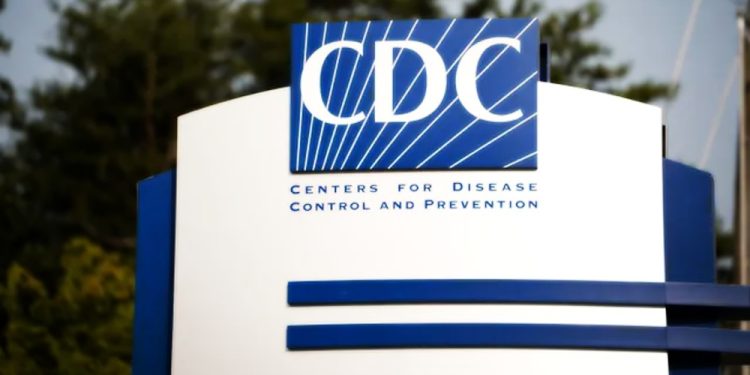A network composed of experts from inside and outside the U.S. government repeatedly recommended that people who suffered adverse events following COVID-19 vaccination receive additional shots, even when the experts could not rule out the vaccines as the cause of the events, documents obtained by The Epoch Times show.
The network, the Clinical Immunization Safety Assessment (CISA) Project, is run by a doctor who has received extensive funding from pharmaceutical giants, including the top two COVID-19 vaccine manufacturers, according to other records.
In one example, CISA was presented with records showing a 63-year-old woman experienced chronic kidney disease, with symptoms including kidney swelling, after receiving a second dose of Pfizer’s COVID-19 vaccine.
CISA subject matter experts (SMEs) said that the diagnosis could not be definitively confirmed without a kidney biopsy but that they still felt comfortable using a causality algorithm for the presumed diagnosis developed in part by Dr. Kathryn Edwards, CISA’s principal investigator.
Applying the algorithm to the case resulted in an “indeterminate” designation, or an inability to rule out the vaccine causing the problem, in part because there was no evidence of other causes. But that inability did not stop the program from recommending additional shots.
“Weighing the potential risks of COVID-19 vaccination and the benefits of preventing COVID-19, the SMEs provided their opinion that the patient should receive future COVID-19 vaccinations,” the Feb. 24, 2023, letter to the patient’s doctor stated.
At the time, the effectiveness of the vaccines against symptomatic infection had been shown to start low and wane quickly, while protection against severe disease began higher but also rapidly dropped.
After the woman received her next shot, the CISA experts said, the doctor should check in on her to see if she experienced recurrent hematuria, or blood in her urine.
“Although the CDC’s subject matter experts claim to have no idea if inflammation of the kidneys in a 63-year-old woman was caused by the mRNA COVID-19 biological, they tell the attending physician to go ahead and give the woman another COVID shot. That amounts to a challenge/re-challenge experiment on a sick woman without informed consent,” Barbara Loe Fisher, co-founder and president of the National Vaccine Information Center, told The Epoch Times in an email.
“Government officials admitting ignorance about a biological product’s potential side effects but directing a doctor to risk a patient’s life by continuing to inject the product into a patient, who already has suffered an injury following use of that product, is immoral,” she added. “We expect and deserve government health officials to adhere to a higher professional and ethical standard of care.”
Some people who experience a problem after a dose of a COVID-19 vaccine have experienced a recurrence of the problem following another dose, according to case studies and surveillance data.
Dr. Edwards, until recently of Vanderbilt University Medical Center, and the CDC did not respond to requests for comment.
CISA features experts with the CDC and other institutions, including Vanderbilt University, Boston Medical Center, and Johns Hopkins University collaborating to respond to doctors who ask the program to review patient cases and provide recommendations.
“CISA provides consultations for U.S. healthcare providers with complex vaccine safety questions about their patients and conducts vaccine safety clinical research,” the CDC states on its website.
- Gold SKYROCKETED during Trump’s first term and is poised to do it again. Find out how Genesis Precious Metals can help you secure your retirement with a proper self-directed IRA backed by physical precious metals.
The first COVID-19 vaccines were authorized and recommended in December 2020. From Dec. 1, 2020, through June 1, 2023, CISA provided 48 recommendations to doctors dealing with COVID-19 vaccines, the records show.
In 39.5 percent of the cases, CISA recommended another vaccination. In 23 percent of the cases, CISA recommended against another vaccination. In 14.5 percent of the cases, CISA said there were no reasons patients could not receive more doses. In the remaining cases, CISA advised reassessing the matter down the road or advising a patient who had not yet received a vaccine to receive a vaccine.
The recommendations for future doses came even in cases where CISA was unable to say the vaccine did not cause the adverse event.
In a letter dated May 4, 2021, CISA experts said there was “no evidence” to support non-vaccine causes for the patient’s condition but that there was “no definitive known association” between the condition and Pfizer’s vaccine, leading to an indeterminate designation in the causality algorithm.
While one of the experts said that in a person “with the right immunologic makeup,” the vaccine “could be an initial inciting injury” causing the condition, many of the experts advised the patient to receive another dose.
The patient might want to receive Johnson & Johnson’s vaccine, which uses different technology than the Pfizer and Moderna messenger RNA shots, CISA said in the letter. “Support for this guidance included that it would avoid the lipid envelope and the mRNA presentation of the antigen to this patient,” they wrote.
In another letter, dated Jan. 18, 2022, CISA experts also found no evidence for non-vaccine causes for the patient’s condition, which appeared after Pfizer vaccination. But they repeated the claim that there was no definitive association between the vaccine and the condition, leading to an indeterminate designation.
CISA experts “strongly felt that the risk of COVID-19 infection was higher than the potential risk from another dose of vaccine,” according to the letter, and recommended a second Pfizer dose.
In a third letter, dated May 23, 2022, CISA experts said the causality algorithm resulted in an indeterminate designation “due to lack of strong evidence against a causal association.” They described a “very perplexing case” and acknowledged the patient’s condition was “not understood.”
But CISA experts still advised the patient, who suffered an event after a Pfizer dose and had also recovered from COVID-19, to receive another shot.
“This would be especially important in light of the current surge in circulating Omicron variants,” they wrote.
Small Number of Causal Determinations
A small number of cases led to the determination that the vaccination caused an adverse event.
In six instances, CISA experts determined that the event was “consistent with causal association,” or caused by the vaccination, because the condition suffered by each patient was “a known possible adverse event following immunization.”
In all six cases, experts recommended against additional doses while advising the doctors caring for the patients to follow up with the patients to figure out which non-COVID vaccines the patients could safely receive.
CISA experts also advised against additional COVID-19 vaccine doses in five other cases. The designations in those cases were also indeterminate, making the differences between them and those that resulted in recommendations for future doses unclear apart from several involving people who had expressed opposition to receiving more shots.
In seven other cases, CISA experts said there were no contraindications, or no reasons for not receiving at least one additional dose. The CDC has maintained a short list that currently includes just two contraindications for the COVID-19 vaccines—a history of severe allergic shock or a history of a known diagnosed allergy to a component of one of the shots.
Patients with other conditions, such as heart inflammation after COVID-19 vaccination, are generally advised to avoid additional doses, the CDC says in the list. But that is only a “precaution,” not a contraindication.
CISA also advised doctors of nine of the patients to reassess future COVID-19 vaccination down the road and, in two of the cases, told doctors that patients who had not yet received a COVID vaccine could receive one.
Hidden Information
The case of the patient with kidney disease was the only one in the CISA records obtained by The Epoch Times that the specific adverse event or events following COVID-19 vaccination was disclosed.
The CDC claimed that the diagnosis information was protected under federal law, which provides exemptions that enable government officials to withhold some information. The CDC redacted the diagnosis information and some other portions of the letters, such as the names of the CISA experts who penned them.
The agency has not explained why one diagnosis was provided while the others were not. The Epoch Times has filed an appeal with the U.S. Department of Health and Human Services, the CDC’s parent agency. The appeal is pending.
Dr. Edwards’ Funding
Dr. Edwards was a professor of pediatrics at Vanderbilt University School of Medicine along with her CISA work. She retired from the university in January. Dr. Edwards has repeatedly backed COVID-19 vaccination for many Americans, including children.
“I agree with the current recommendations that all children between 5-11 years old should be vaccinated. The risk of disease is greater than the risk of myocarditis,” Dr. Edwards told The Epoch Times in an email in 2022. She did not provide any citations.
Dr. Edwards has received funding from numerous companies, including Pfizer and Moderna. Pfizer has paid Dr. Edwards $83,491 since 2016, according to a U.S. government website listing payments to doctors. Pfizer paid Dr. Edwards at least $11,900 each year from 2020 to 2022.
Moderna and Johnson & Johnson subsidiary Janssen have also paid Dr. Edwards, including during her time as principal investigator of CISA.
Dr. Edwards disclosed her conflicts of interest in some papers but not at other times, such as at least sometimes when speaking to reporters or in public presentations. Dr. Edwards was also part of the board that oversaw Pfizer’s trial.
“I’ve been an adviser to Pfizer and I’ve been working very, very closely with Pfizer, particularly their COVID vaccines and going over lots of reactions and adverse [events],” Dr. Edwards said in a 2022 deposition.
When pressed on whether financial incentives can affect people’s judgement, Dr. Edwards said it does not affect her decisions.
“What you’re presuming is that because I have been an adviser makes me on their dole or makes me going to say what they want me to say that … is not and has never been a part of my being. I say what I believe based on my expertise,” she said.
Emails
Another set of documents obtained by The Epoch Times shows doctors contacting the CDC for CISA consultations.
“Hello, needing safety advice for a patient of mine on COVID-19 vaccination with mRNA vaccine,” one doctor wrote. The doctor said that one of their new patients had a reaction to Tdap (tetanus, diphtheria, pertussis) vaccine and wondered whether it would be safe for them to receive Pfizer’s COVID-19 vaccine.
In another email, a doctor said that a patient experienced a problem two hours after receiving a dose of Moderna’s vaccine but that the condition had “mostly resolved” later. The doctor asked whether it was safe to receive a second Moderna dose or whether it would be better for the patient to receive Johnson & Johnson’s shot.
A third email showed a doctor describing a “somewhat atypical case” where a patient presented with symptoms 25 days after a Pfizer shot. “I haven’t heard of [redacted] before this case,” the doctor said, before requesting advice on whether the patient should receive another dose.
In other cases, doctors asked the CDC whether patients should receive waivers for COVID-19 vaccination. The CDC informed the doctors that the agency does not issue exemptions from COVID-19 vaccination requirements.
Full Numbers
Here are the full number of inquiries and completed consults for CISA through Nov. 4, 2022:
Total inquiries: 1,394 Inquiries for COVID-19 or COVID-19 vaccines: 1,334 Number of CISA consults completed: 79
Number of COVID-19 inquiries in December 2020: 41 Number of COVID-19 inquiries in 2021: 1,077 Number of COVID-19 inquiries in 2022: 216







